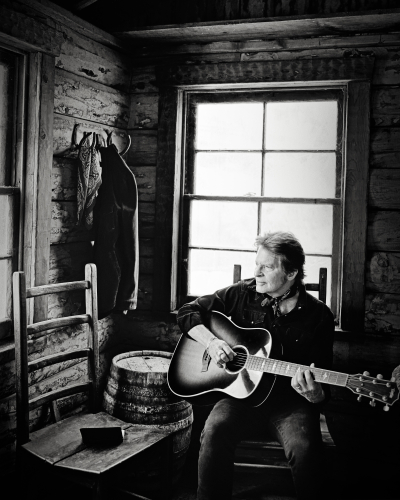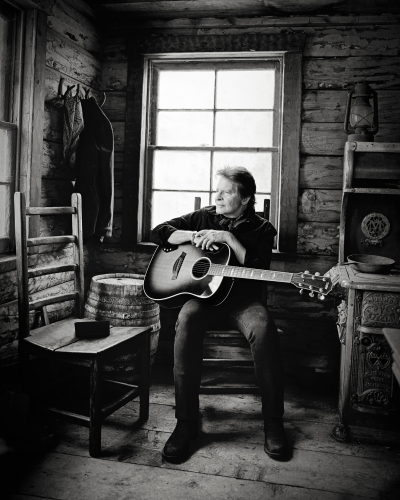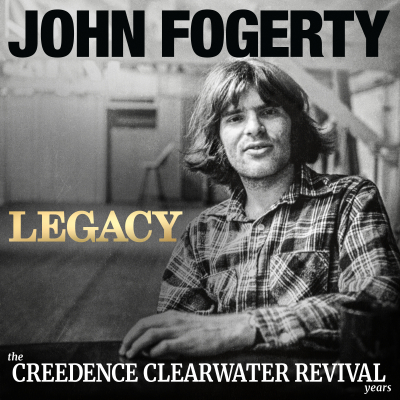John Fogerty
Click  on photo to download high resolution version
on photo to download high resolution version
All rights reserved. Photos are for editorial use only.
Photos
Latest ReleaseView All
Legacy: the Creedence Clearwater Revival years
Release date: 8.22.25
Label: Concord
Press Releases View All
John Fogerty Takes A Victory Lap With New Album ‘Legacy: The Creedence Clearwater Revival Years,’ Out Now
Read MoreJohn Fogerty Celebrates His Legacy With New Recordings Of “Travelin’ Band” And “Long As I Can See The Light”
Read MoreThe Celebration Continues: John Fogerty Releases Two New Singles From Upcoming Album Legacy: the Creedence Clearwater Revival years (out August 22)
Read MoreBiography View
Grammy winner, Rock & Roll Hall of Famer, and Songwriters Hall of Famer John Fogerty is a towering figure in American music. As the leader of Creedence Clearwater Revival and as a solo artist, Fogerty forged an entirely distinctive sound—equal parts blues, country, pop, rockabilly, R&B, swamp boogie, and Southern fried rock & roll—alongside powerful, resonant lyrics, true workingman’s poetry.
His classic songs, including “Proud Mary,” “Fortunate Son,” “Born on the Bayou,” “Bad Moon Rising,” and “Have You Ever Seen the Rain,” have sold over 100 million copies. His 1997 Blue Moon Swamp won the Grammy for Best Rock Album, and his solo work has been nominated for a total of 8 Grammys over the years. He’s even the only musician to be inducted into the Baseball Hall of Fame for his song “Centerfield,” a staple at ballparks across the country.
So Fogerty’s status as a legend has long been secure. What’s more remarkable, though, is how popular and influential his music remains after more than 50 years.
Recently, Rolling Stone ran a story with the headline “The Biggest Band in America in 2024 is…Creedence Clearwater Revival.” John Fogerty and his monumental collection of CCR hits on Chronicle: The 20 Greatest Hits has spent 746 weeks and counting—more than 14 consecutive years—on the Billboard 200 album chart.
In 2025, Fogerty has continued this momentum with a series of high-profile appearances, including a keynote speech at SXSW, induction by Bruce Springsteen at the American Music Honors for his influence on American music, and fiery headline sets at JazzFest, Glastonbury, and the Hollywood Bowl. All this in the year which also sees him celebrating his 80th birthday.
This milestone is also being marked with the release of Legacy: The Creedence Clearwater Revival Years, an album which includes newly re-recorded renditions of 20 of Fogerty’s most beloved songs. Inspiration for this project began in 2023, after Fogerty fulfilled a longtime personal mission when, after a series of lawsuits, he acquired a majority interest of the worldwide publishing rights to his song catalog from Concord Records. But his wife, Julie, realized that the rights to the recordings themselves would never revert to him, and began floating the idea of cutting new versions backed by his family band.
“For many years, I had a struggle with the music business, the companies that I had been signed to way back when I was a kid,” says Fogerty. “I was always proud of the songs I wrote, but I had to do this weird mental separation between owning them and being the spiritual owner. Now that that was removed, my relationship to it all became different and it became really a nice feeling, especially working with my family.”
Rather than reinterpret his CCR-era masterpieces, he opted to recreate the originals as closely as possible. “There's a zillion things you could do—Americana or folk rock or acoustic,” he says. “But that just seemed to me like a tangent that maybe people wouldn't want. Either you're going to be way different, or you're going to try your best to sound exactly the same. And that was kind of a cool challenge. I'm competitive and maybe a little bull-headed, so it became the mission—at times blissful and sublime, and other times a really hard task.”
Recording this material wasn’t just a matter of dropping in and singing songs he’s performed many hundreds of times; it required getting back into the mindset he had when he originally went into the studio, and precise study of his guitar parts. “My son Shane would help me,” Fogerty says. “He'd be listening and learning himself and he’d say, ‘Dad, there's way more going on in this part.’ I'd go, ‘Oh my goodness, listen to that!’ and then I had to relearn a much more technical way of playing. I had 50 years of bad habits—playing the easy way so that I could sing at the same time.”
The Legacy album is the latest result of a steady output in recent years. During the 2020 quarantine, the Fogerty Family—featuring John with his sons Shane and Tyler and his daughter Kelsy—started a weekly video series from their home studio called “Fogerty’s Factory,” which became so popular that they documented it with an album. In 2021, Fogerty released his first new original solo music in eight years, “Weeping in The Promised Land,” a moving tribute to those who had been affected by the pandemic, as well as those who have suffered through prejudice and injustice.
Gaining the rights to his publishing was the fulfillment of a lengthy crusade. For years, the copyrights to Fogerty’s songs were the property of Saul Zanetz, the owner of Fantasy Records. The conflicts Fogerty had with the label became the subject of multiple lawsuits; first, he won a case that Fantasy brought against him for copyright infringement and then, when he was held liable for his attorneys’ fees, he countersued and in a groundbreaking 1994 decision, the United States Supreme Court ruled that it was unfair for successful defendants to face a higher burden than successful plaintiffs. Both verdicts represented hard-fought victories for the rights of artists everywhere.
Zanetz sold the label and its publishing portfolio to the former Concord Music Group in 1995. Fogerty, who had extricated himself from Fantasy in 1974, re-signed with the label upon its purchase by Concord but he was still not able to gain ownership of his songs until this deal was completed.
“They had the product of my work, my voice and my songs, so I was treated like a non-entity,” he says. “A lot of times, my music was used in ways I disagreed with, and I had no say in the matter. It was a heartbreaking feeling.
“The day that we got it signed was a big celebration, but you don't really know exactly what it means. For these past couple years, though, we've lived a different life. They can't just go do stuff and we don't like it. They have to ask us now. We've taken that on in such a profound way and boy, it sure feels great. For most of my life I did not own the songs I had written. Getting them back changes everything. I will celebrate this for the rest of my life.”
(He points out that Legacy is coming out on Concord, the same label that also has the Creedence recordings—"that tells you, right there, that something right must be happening.”)
Soon after acquiring ownership of his catalog, Fogerty took to the road on the 2024 “Celebration” tour, playing almost fifty dates including storied venues like Red Rocks and Bethel Woods (the site of Woodstock) and a residency in Las Vegas. Reviews described the show as a “high energy rock ‘n’ roll party” and noted that “Fogerty’s enthusiasm and happiness were infectious.”
It's been an amazing journey for John Fogerty—a working-class kid from the Bay Area suburbs who fell in love with rock & roll and dreamed of a mythic America. One of the few rock stars drafted in the Vietnam era, he put in his time with the Army, gathered his band, and fought his way up through the local bar scene.
“At the end of 1968,” he says, “I took stock of my position and looked at the fact that we had one hit. We could forever be a one-hit wonder. We didn’t have a manager or an agent, we just had a teeny, tiny record label that was mostly a jazz label, and I realized I’d just have to do it with music.”
Between 1969 and 1971, CCR went on a historic hot streak, releasing fourteen consecutive Top 10 singles and five consecutive Top 10 albums, two of which—Green River and Cosmo’s Factory—went to Number One. Decades later, Fogerty remains a paragon of songwriting, a voice of protest, and a beacon of integrity.
Digging so deeply into the Creedence recordings for the Legacy project has meant coming full circle for John Fogerty, and he found the process enlightening and cleansing. “There's been a lot of controversy and struggle over the years involving my music,” he says. “Coming to grips with how great these records are and getting to redo them, getting them to live up to that standard that I had set for myself all those years ago, has been really good for me. It let me have a relationship with the music that's purely based on the goodness of the music and not worrying about all the other stuff that got attached later.
“I'm 80 years old,” he says. “I'm giving myself a gift with this album, and I'm giving my fans a gift at the same time.”
_
TRACK BY TRACK
“Up Around the Bend”
The original is full of energy. I wrote that song on my motorcycle, so it's got a sense of urgency and speed—wanting to get away, and also wanting to get to something. That's what the song's about, and the riff really reflects that. I had Shane play the riff, and now I own my old, original Acme guitar again, which Julie found five or six years ago, and it sounds like no other because I put a humbucker pickup on the bridge position of a Rickenbacker guitar. So I had the dual wonderful experience of getting the sound just right, but also getting to teach that technique to my son. After that process was done, I realized that a shoemaker, a cobbler in a little village, puts up a sign that says “Fogerty and Sons,” and it was kind of like that. This track is every bit as great as the original, and it's got that extra ingredient of passing on the flame.
“Have You Ever Seen the Rain”
I wrote this song in a melancholy mood. It's actually about Creedence, breaking up; the writing surely was on the wall by then. What young musicians really need is a strong manager or a father or somebody to take them all by the collar until they get over it. Everybody's got an ego and power and girlfriends and all the rest, so it ends up a mess sometimes, and that's what the song was written about.
But these days, the song really reminds me of the blessing that I have, the fans out there that have been singing these songs all these years. There’s a rainbow in the song, and I guess I'm arriving there now.
“Porterville”
“Porterville” was really a breakthrough. I wrote it while I was in the army, marching around on these hot parade fields of asphalt. I came up with this story that was a little bit biographical and a little bit of whimsy. It turned out to be a pretty cool song. It was the first song that kind of had a story and something a little deeper—you had to go looking for the meaning.
In some ways, this version is actually better than the Creedence version. It's a little bit more haunting and more a groove. It was not quite realized as a recording at the time. I was still learning, and I think that's the main drawback. I always thought it was a good song and performed well, and certainly I sang it well in those days, but it was a glimpse of things to come.
“Born on the Bayou”
This one is really fun. I had to sit down and learn what I was doing on the guitar on the original because it was spontaneous. I was singing and playing at the same time, so the guitar parts fluctuate in between the vocal lines. I had to learn my spontaneous moves in the here and the now to try and capture the same feeling as the original track.
Another really neat thing with these recordings is that Bob Clearmountain mixed them in Atmos. It's this very modern kind of mix, a whole bunch of speakers and all that sort of thing, and “Born on the Bayou” sounds really great in Atmos.
“Lodi”
This is one where the guitar part is actually quite intricate compared to what I've been playing on stage. Shane had to say, “Dad, you're doing a lot more on the old record than you’re doing now.” I'm covering some strings and sliding them up and down the neck and stuff like that—I didn't even know I knew how to do that then. So I had to relearn the part.
When it came time to sing it, I noticed that my voice seemed to have a little extra character in it from the guy who sang this same song 50-plus years ago. You could hear some more years in that guy's experience. It wasn't so much that my voice changed, which it probably did a bit, but something in the way a person speaks that gets communicated beyond the actual words.
I realized that I had to do my darndest to get my mind into the same place that it was when I did the original vocal. I had to reflect and think about the words of the song, think about the times, make myself go back into that spiritual plane of existence and face that—because during my dark times, I didn't want to do that. I wanted to avoid all that. Julie said, “You're going back there, aren't you?” I could almost cry from her saying that, because I was learning that’s what I had to do.
“Traveling Band”
I was obviously trying to channel Little Richard back in the day, with the horns and the whole thing, just loving that music. Back then, of course, the power was limitless. I could just, at will, open my mouth and do that—after a couple, three years of being on the road, my voice was really spitting out flames.
After all these years, I had to really work myself up to get there. It's not an everyday thing. But hopefully as I continue to work on this, it will get back to that level again. But that was a physical fact, like climbing a mountain, and it took a few different days and few different takes for sure. I would sing until I didn't have anything left to sing with.
“Long as I Can See the Light”
This is another one that people have told me they can hear the experience in my singing, or at least the ghosts of a long trail, a long path. I'm really proud of this track. The saxophone player in my band, Rob Stone, is a wonderful musician, and he wanted to get into the parts that were on the original, so he learned all the little ad libs and things. I think the singing was the same thing. There's a standard, and you just have to pull yourself by the collar and keep facing the challenge until you feel like you've really matched it.
Online
- Official Site
- .(JavaScript must be enabled to view this email address)









